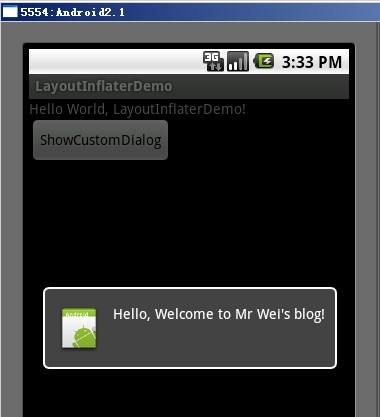Android高手进阶教程(五)之----Android 中LayoutInflater的使用!
大家好我们这一节讲的是LayoutInflater的使用,在实际开发种LayoutInflater这个类还是非常有用的,它的作用类似于 findViewById(),
不同点是LayoutInflater是用来找layout下xml布局文件,并且实例化!而findViewById()是找具体xml下的具体 widget控件(如:Button,TextView等)。
为了让大家容易理解我做了一个简单的Demo,主布局main.xml里有一个TextView和一个Button,当点击Button,出现 Dialog,而这个Dialog的布局方式是我们在layout目录下定义的custom_dialog.xml文件(里面左右分布,左边 ImageView,右边TextView)。
效果图如下:

下面我将详细的说明Demo的实现过程:
1、新建一个 Android工程,我们命名为LayoutInflaterDemo.
2、修改main.xml布局,里面主要在原来基础上增加了一个Button.代码如下:
<?xml version="1.0" encoding="utf-8"?> <LinearLayout xmlns:android="http://schemas.android.com/apk/res/android" android:orientation="vertical" android:layout_width="fill_parent" android:layout_height="fill_parent" > <TextView android:layout_width="fill_parent" android:layout_height="wrap_content" android:text="@string/hello" /> <Button android:id="@+id/button" android:layout_width="wrap_content" android:layout_height="wrap_content" android:text="ShowCustomDialog" /> </LinearLayout>
3.定义对话框的布局方式,我们在layout目录下,新建一个名为 custom_dialog.xml文件具体代码如下:
<?xml version="1.0" encoding="utf-8"?> <LinearLayout xmlns:android="http://schemas.android.com/apk/res/android" android:orientation="horizontal" android:layout_width="fill_parent" android:layout_height="fill_parent" android:padding="10dp" > <ImageView android:id="@+id/image" android:layout_width="wrap_content" android:layout_height="fill_parent" android:layout_marginRight="10dp" /> <TextView android:id="@+id/text" android:layout_width="wrap_content" android:layout_height="fill_parent" android:textColor="#FFF" /> </LinearLayout>
4.修改主程序LayouInflaterDemo.java代码如下:
package com.android.tutor; import android.app.Activity; import android.app.AlertDialog; import android.content.Context; import android.os.Bundle; import android.view.LayoutInflater; import android.view.View; import android.view.View.OnClickListener; import android.widget.Button; import android.widget.ImageView; import android.widget.TextView; public class LayoutInflaterDemo extends Activity implements OnClickListener { private Button button; public void onCreate(Bundle savedInstanceState) { super.onCreate(savedInstanceState); setContentView(R.layout.main); button = (Button)findViewById(R.id.button); button.setOnClickListener(this); } @Override public void onClick(View v) { showCustomDialog(); } public void showCustomDialog() { AlertDialog.Builder builder; AlertDialog alertDialog; Context mContext = LayoutInflaterDemo.this; //下面俩种方法都可以 ////LayoutInflater inflater = getLayoutInflater(); LayoutInflater inflater = (LayoutInflater) mContext.getSystemService(LAYOUT_INFLATER_SERVICE); View layout = inflater.inflate(R.layout.custom_dialog,null); TextView text = (TextView) layout.findViewById(R.id.text); text.setText("Hello, Welcome to Mr Wei's blog!"); ImageView image = (ImageView) layout.findViewById(R.id.image); image.setImageResource(R.drawable.icon); builder = new AlertDialog.Builder(mContext); builder.setView(layout); alertDialog = builder.create(); alertDialog.show(); } }
5、最后执行之,点击Button,将得到上述效果。
岁月本长而忙者自促;天地本宽而卑者自隘;风花雪月本闲,而劳忧者自冗;天行健,君子以自强不息;地势坤,君子以厚德载物;宠辱不惊,闲看庭前花开花落;去留无意,漫随天外云卷云舒.不妄取,不妄予,不妄想,不妄求,与人方便,随遇而安




 浙公网安备 33010602011771号
浙公网安备 33010602011771号